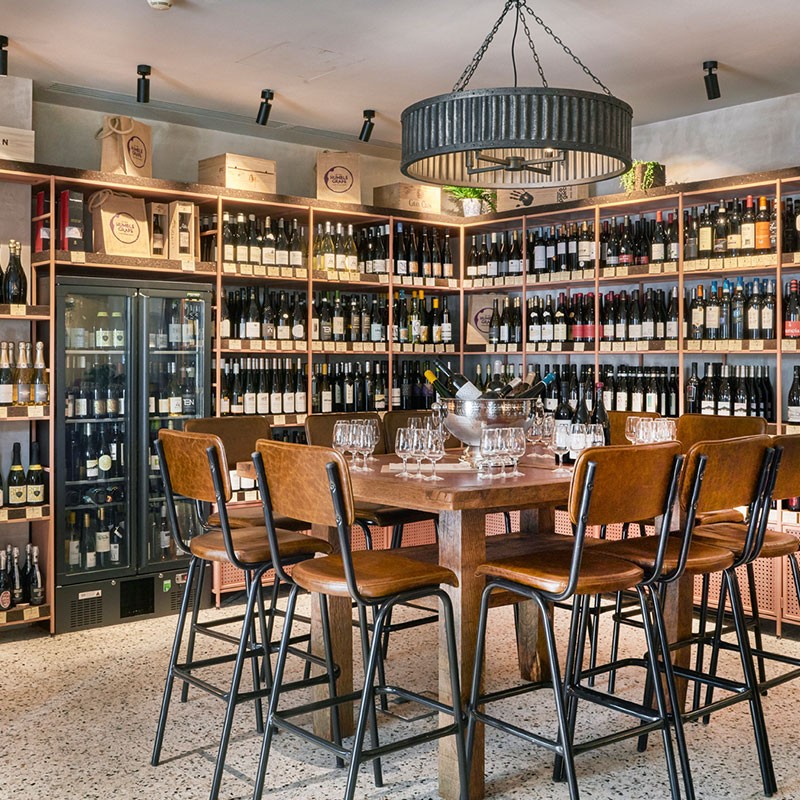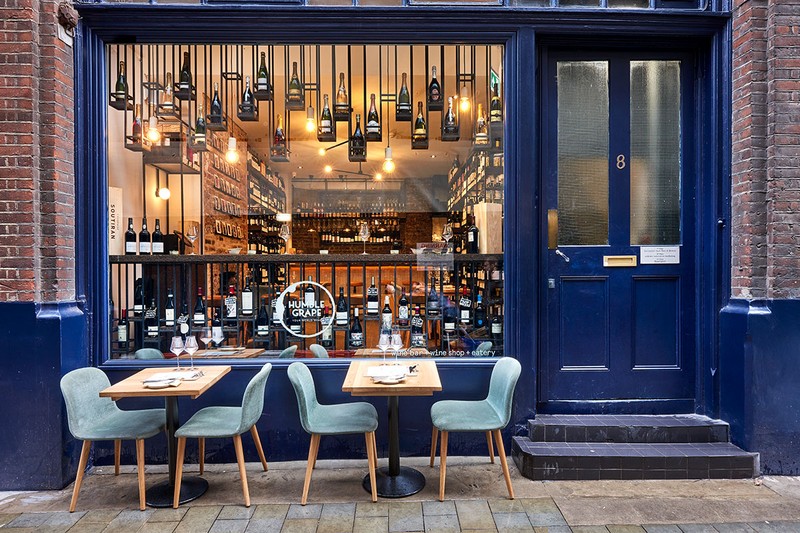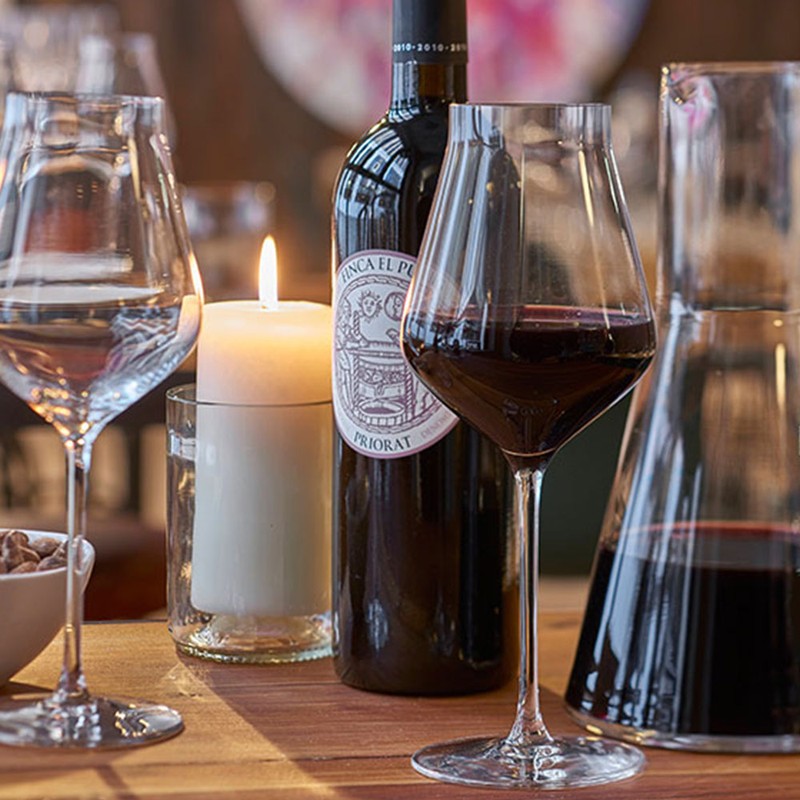Humble Hero: How James Dawson Made It In Wine
I came over to London from South Africa in 1997 and got a job working for HSBC in its investment bank. About eight months in, they sent me to Paris to help set up a government bond trading business. The plan was to stay in France for six months, but I ended up spending two years there, during which time I got seriously into wine. It was actually the father of one of my Parisian friends who was responsible for this. He was a master chef and, whenever I went over for dinner, he would teach me about wine and food pairings. That was really how I fell in love with it all.
I was 24 and I wanted to explore France more broadly. I loved Paris, but soon discovered how easy it was to venture out of the city, so I would rent an old car and drive out to the Loire Valley and Bordeaux, and explore the winelands.
The idea for Humble Grape came to me while I was lying on a beach in the Dominican Republic. It had been a few years since I had completed my MBA and I really wanted to start my own business. I was still obsessed with wine so it was a no brainer. On that same holiday I met a guy called Paul who happened to import wine into the UK. When I got back to London I bought about ten cases of wine from him, and emailed my friends to see if they’d be interested in joining me for a wine tasting. This developed into more of a monthly thing, with lots of different wines. I would find pop-up venues around London and hold very informal tastings with friends, teaching them about different grapes from all over France – the Rhone Valley or Burgundy or the Loire area. Then people started wanting to buy the bottles they’d tried. Then I was asked if I could deliver too, so it sort of snowballed from there.
I was still working full time so I was delivering cases of wine on my motorbike on the way to the office. I’d get up at six in the morning, make the deliveries and be at my desk in time for the markets to open. I could fit 12 bottles on my back seat, secured with bungee cords and then another six in my top case. If I couldn’t get around in the morning, I would go back on my way home to finish the deliveries. I did this until 2011 when I made my first hire. He was an Aussie guy who had a lot of experience as a winemaker. Together we started importing our own wine. We got some warehouse space and began selling to restaurants. What had started off as small and intimate wine tastings grew bigger and bigger – to the point where we were doing huge corporate events for 100 to 150 people.
It is very difficult to make significant money selling wine to restaurants. The wines we fell in love with and imported were all very high-quality boutique wines from small family-run vineyards. Restaurants weren’t interested in that sort of provenance. They wanted cheap or well-branded wine they wouldn’t struggle to sell and that wasn’t what we were offering. That’s when we decided to refocus Humble Grape as an experience business as opposed to a product business that traded on price and volume. To create those experiences, we needed to own our own sites and wine bars.
I did a crowdfunding round on Seedrs in 2014 and raised about £550,000 which we used to open our first wine bar in Battersea. Getting our first site was extremely challenging because we were a start-up and landlords weren’t willing to talk to us. We finally managed to convince someone and, within six months of opening, the brand was going really strong and the wine bar was in the top ten on Tripadvisor. We secured our second site in 2016 in Fleet Street then, in early 2017, we did another crowdfunding round and raised £1.3m, which we used to open our Islington site in July 2017 and our Devonshire Road site in January 2018.
A startup is synonymous with uncertain future cash flows. You can’t know and you can’t predict how much you’re going to be able to afford to pay back, so when it comes to funding, choosing equity crowdfunding is a much safer thing to do than debt crowdfunding. If you do debt crowdfunding and raise say £1m of debt, you have to pay that debt back and you have to pay interest on it. With equity crowdfunding, you are actually giving a share of your company away so, although you lose a chunk of the business, you don’t have to pay the money back – only if or when the company gets sold in the future.
The secret to our success? Our loyal customer base. People love our brand and they believe in what we are doing, supporting small winegrowers all over the world and bringing their produce to the UK. They like how we deliver the experiences, which are friendly and fun – it is all about the enjoyment of discovering wines. For every person who walks through the door, it is our job to find the best wine for them. That relationship with our customer instigates loyalty, so if we need to raise further funding for a new wine bar, they’re generally pretty happy to invest in us. Our customers can feel the brand, experience it, talk to the staff and actually taste it, which wins hearts and minds a lot easier than a business based on a concept.


Originally it was just me travelling to wine regions. I would find a very high-quality vineyard which was known in the industry, taste the wines and chat to them about young, upcoming winemakers in the region which they loved, and whose wine they were drinking. They would share those details with me and I would go to these young upstarts and buy from them. I knew I couldn’t compete with the big wine buyers like Berry Bros and Majestic; I couldn’t get the sort of access to the winegrowers that they had, so I went and got the new guys instead. Now we have a team of four people who have been extensively educated and certificated in wine buying. I work with them to find new wines which are authentic, interesting and – most importantly – biodynamic or organic. We do not buy wine unless it has been sustainably produced and we don’t buy from winegrowers who use pesticides or harmful production processes.
The quality and price has to be right. If we are bringing wine into the UK and selling it for £30 a bottle in our wine bar, we must believe it is worth the price. The four things I look for in a wine are authenticity, good quality, a fair price and an interesting story. We don’t compete on price: our cheapest bottle of wine will be around £28, which may well be more expensive than the cheapest bottle in a restaurant, but I guarantee it will be double the quality. A restaurant will be buying from a big distributor who is buying from a big importer and so on. This increases the price so you’re going to get a lot less wine for your money. The wines at Humble Grape are much more niche and of a really high quality, so we don’t have those cheaper £15 bottles. But they are worth every penny.
Wine is a very complex product. There are millions of different types in the world, hundreds of thousands of people producing it, dozens of grape types, lots of ways of making wine from the same grape, and different regions to buy wine from. Not only is there complexity but there is risk. If I buy a £30 bottle of wine, there is no guarantee I will like it, even if I have been told it is a really popular one that everyone else enjoys drinking. That’s the risk you take and, if you’ve spent £30 on a product that you don’t like and don’t want to drink, that’s not a great place to be in. That is why I wanted to create Humble Grape. Our slogan is ‘Your World Wine’ because it is all about reducing that complexity, taking the risk out of it for the consumer and giving them a wine that they love, by giving them samples, asking them plenty of questions about their tastes, and really drilling down into what wines they like. When you come into Humble Grape, you will be asked a whole host of questions from how you take your coffee, whether you use sugar or sweeteners and if you like lemons. The answers give us an accurate profile from which to work, so we can ensure the risk is eliminated.
Slovenian wines like Kerner are selling really well at the moment. Slovenia has tons of new grape varieties, which people have never heard of, but which are very high quality and really good value. Wine trends are always seasonal: reds are more popular in the winter, with whites and rosé performing well in the warmer months. Around this time of year, we get people coming into the bars wanting to try and buy higher-priced wines as they stock up for their festive dinners. While 70% of our revenue is made through the wine bars (by people coming for a drink, attending a wine tasting or having dinner in one of the bars) we also make money selling our wines online through our website. You can buy direct when you come into the bar and we also operate through UberEats and Deliveroo.
Selling wine lends itself to a digital platform but we have gone in an opposite direction. There are so many big wine companies out there spending millions on Google advertising and the landscape is cluttered with successful businesses like Virgin Wines and Naked Wines. Where we can compete is on experience – you can’t sell the Humble Grape experience on Amazon. People are always going to want to go out, socialise and spend time with their friends. They are also, given the chance, going to want to touch, buy and taste a product before they buy it. That is why we went down the bricks-and-mortar route.
A typical day for me is busy. Monday and Tuesday I am at our Fleet Street site where I meet the GMs and talk to the wine managers about what is going on in their bar, how the weekend performed, what worked and what isn’t working. Wednesday I spend in our Liverpool Street bar. Thursday I am in Islington, then Friday morning I go to Battersea. We hold monthly meetings where we brainstorm ideas and talk about potential events. Two months ago we came up with the idea to run a wine appreciation master class. You have to buy a £10 voucher to spend in Humble Grape but with that you get a free wine tasting which is about 45 to 60 minutes long; you get to try four different grapes and it teaches the basics about wine. We do this from all our sites and we’ve found it’s been really popular. It gets people through the door and gets them familiar with the Humble Grape concept, and hopefully they will return.
My favourite part of the job is the people: spending time with my customers and also spending time in the vineyards, meeting the makers, walking around the vineyards, tasting the wine and learning about the grape. If I could spend two or three months a year travelling to the winelands, I would. Unfortunately, I’ve got all the rest of the business to do – from the marketing to the accounting and the tax – so that would not be a great idea. My biggest challenge at the moment is the market. It’s in a really weird place because of the political climate: people are spending less and going out less, so that is always going to impact trading. It is also always challenging finding really great people to hire. Getting the best people is always good for business, but it is not always easy.
Growth plans for Humble Grape are on pause until the end of next year, when we know what the political climate will look like. The economy needs to improve first, but hopefully in 2021 we will open two more sites, potentially around London Bridge and Kings Cross.
James’s Favourites
Red
A Cabernet Franc from a producer in South Africa called Rainbow’s End. You’ll find the same grape in Saint-Émilion in France and these guys have been making the best Cab Franc in South Africa for a long time.
Rainbow’s End Cabernet Franc, 2017
White
It’s got to be this one from one of our Slovenian winemakers. This Gönc is a winning white and it’s one of the most exciting wineries in Europe at the moment.
Gönc Winery Yellow Muscat, 2018
Rosé
An elegant, pale and fruity rosé made from vines planted on clay and limestone slopes.
Domaine des Aspras Les Trois Frères Rosé, 2018
Sparkling
Made with the Champagne method but in Burgundy, this Crémant is made exclusively from Chardonnay. Floral and fresh, only 1,000 bottles are made each year.
Domaine André Bonhomme Crémant de Bourgogne Brut, 2016
Everyday
Another amazing bottle from winemaking maestro Peter Gönc. This is an easy-drinking red from Slovenia.
Gönc Winery Blaufränkisch, 2017
Special Occasion
This Pinot Noir has sweet, woody and mushroom notes because it has been delicately aged, over 17 months, in Fouquet and then Seguin Moreau Icône barrels. It is only produced in the finest years and in tiny quantities, like 600 cases.
Dutton Goldfield Freestone Hill Vineyard Pinot Noir, 2016
From The Supermarket
It would have to be this Bordeaux.
Chateau Musar
For more information, visit HumbleGrape.co.uk
DISCLAIMER: We endeavour to always credit the correct original source of every image we use. If you think a credit may be incorrect, please contact us at [email protected].


